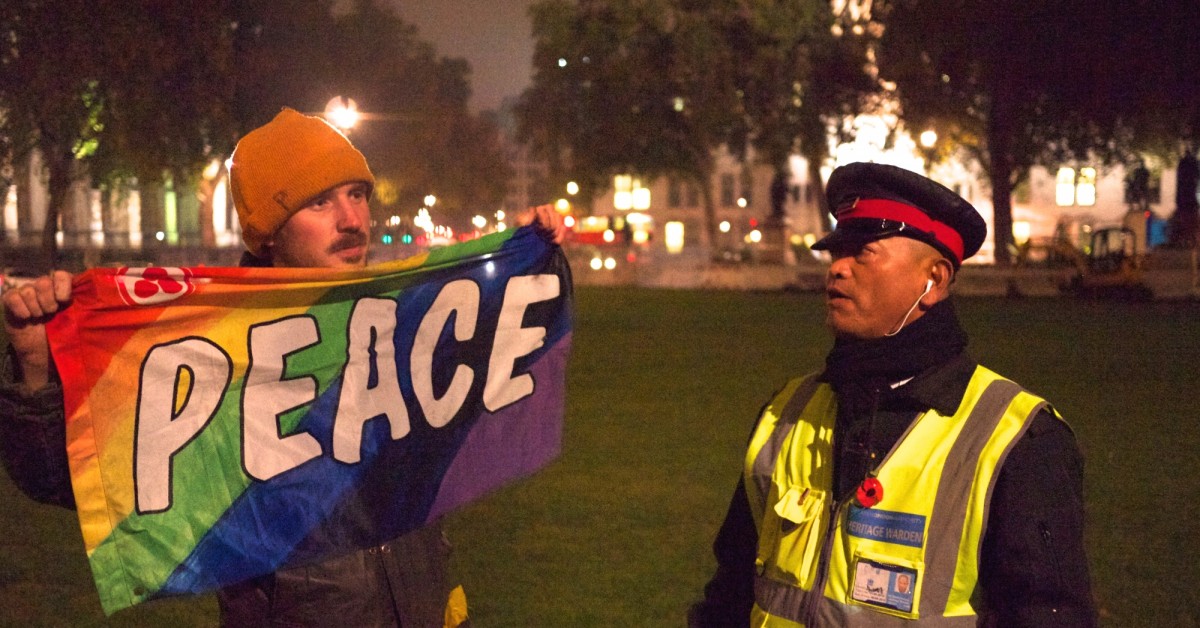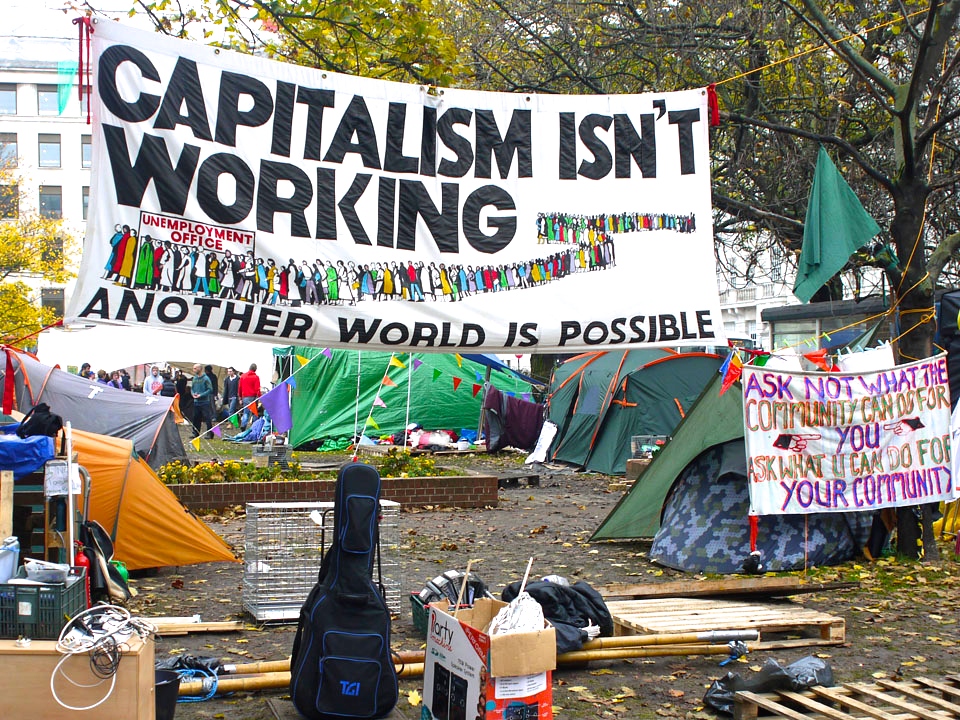“We need a massive campaign for real democracy because a tiny few have more and more power and money," George Barda, a supporter of Occupy London tells me. "Wealth is not trickling down but gushing up at increasing speed with no end in sight.”
Occupy London plans to take Parliament Square for 10 days, from October 17 through October 26, in a camp called Occupy Democracy. The occupation seeks to connect the dots between multiple crises and show how the U.K.'s current economic and political direction represents a failure of the democratic process and the increasing dominance of the 1%.
The occupation is demanding the reverse of current government policies by which the U.K.'s corporate-led parties have backed measures that include the privatization of the National Health Service, imposition of the bedroom tax, a rise in fracking, growing university tuition fees, benefit cuts for people with disabilities and support for the secretive TTIP trade treaty.
Most crucially, the Occupy Democracy camp provides a platform to discuss the many alternatives to the current system. Barda explains that in the current system, only a few are gaining at the expense of everyone else.
“The middle is increasingly dependent on unstable house prices and pensions, in corrupt and bubble-prone markets likely to implode without warning. And the most vulnerable in society – the elderly, the disabled and children living in poverty – more than any other country in Western Europe are still the ones paying the most for the bankers’ crisis,” says Barda.
“This is a recipe for a brutal, broken, divided country that tragically wastes the incredible potential of millions of its citizens. This is not the country we would have if it were really up to us.”
Momentum Building in the Anti-fracking Movement
The movement to protect Britain against fracking, discussed in the video above, points out that the U.K. government has no political mandate to push hydraulic fracturing. Before the last elections, Conservatives claimed they would form the "greenest government ever.".
Instead, independent studies conclude that fracking greatly endangers human health, the climate and the environment – through chemical contamination of underground water sources, methane emissions and other impacts. The government meanwhile justifies its dash for gas based on studies sponsored by the fracking industry, which paint the opposite picture.
Activist Tina Rothery says that when local residents discover fracking occurring in their region, often their first response is to try democratic means to stop it – only to find that their voices do not get heard. So Rothery and other concerned mothers and grandmothers recently took their protest to a new level and occupied a proposed fracking site, launching nationwide direct actions against government fracking plans.
Rothery says the U.K. government has made it this far against public opposition to fracking because 1. Government and industry are intertwined, and 2. The mainstream media is owned by a small number of elites that benefit directly from the economic potential of fracking.
Lord Browne exemplifies the incestuous government-business relationship: he chairs the country's leading fracking company, Cuadrilla, while holding a non-elected government role charged with oversight of fracking regulators. Meanwhile, Rupert Murdoch's media empire includes the Sun newspaper, a leading cheerleader for the fracking industry, as Murdoch himself holds vast fracking investments.
Nonetheless, public opposition to fracking is increasing rapidly as more people become aware of its dangers. A recent poll showed 71% of young people in the U.K. are against the unconventional drilling process. At the same time, more and more people are voicing support for viable green alternatives, heralding the shift toward a more democratic, ethical and egalitarian future.
Activism Seizes London
In response to the corporate slanted media landscape, activists from the Radical Housing Network will join Occupy in Parliament Square to hand out the “Standard Evening” – a satirical reworking of the London newspaper Evening Standard, which is renowned for pushing a corporate, neoliberal agenda.
On Friday, 40,000 Standard Evenings will be printed to deliver news-that-could-be in London, prioritizing people over profits and offering real solutions to the city's housing crisis. The newspaper giveaway is part of a week-long event by groups opposing MIPIM U.K., a property fair that focuses on selling off public land to private investors.
Occupy Democracy is also receiving support from the Green Party, the trade union PCS, the NGOs War on Want and World Development Movement, and the Tax Justice Network. Each day of the 10-day occupation will be themed around a different issue of crisis and alternatives – coinciding with the Occupation of the City of London's third anniversary.
Those lined up to lead skill-shares and discussions include renowned economist Ha Joon Chang, the radical thinker John Hillary, and mothers from the housing activist group Focus E15.
“We need to recognize the extent that our democracy has been captured by the City of London and take appropriate action to reverse that,” says John Christensen, director of the Tax Justice Network, speaking in this short film in the run-up to Occupy Democracy.
Christensen's alternative vision to tackle tax injustice includes transparency in political funding, shutting the "revolving door" between politicians and business, heavily regulating corporate lobbying, and stopping City of London senior executives from landing un-elected roles in government. The Tax Justice Network – a coalition of experts focusing on tax havens, corporate tax evasion and its costs to democracy – has revealed that $21 trillion was lodged in tax havens in 2010.
“Political parties get a large proportion of their funding from offshore sources and it goes without saying that these parties are heavily influenced by offshore companies and wealthy people," adds Christensen. "So the offshore system has deeply corrupted the nature of democracy in Britain, Europe and elsewhere.”
Rejecting the TTIP
U.K. opposition to the Transatlantic Trade and Investment Partnership, or TTIP, is another example of how quickly popular movements against corporate influence are growing, as reflected in Occupy Democracy.
“TTIP and the other trade treaties are about rewriting the rules of the global economy to further benefit big business, which will be detrimental to ordinary people being able to exercise their voice,” says Nick Dearden, the director of World Development Movement who also featured in this video showing support for the occupation of Parliament Square.
Dearden adds about TTIP: “If it does become law it will give big business the power to sue our government for making legislation in the public interest – in the interest of the environment, for example food standards. TTIP will give big business a parallel process, so it does not even go for our courts system.”
A central tenet of Occupy Democracy is this: if we want to change the current system and move away from these multiple crises toward solutions, it must involve people taking to the streets.
As Dearden says: “Parliament and the surrounding area are called the ‘home of democracy’ [and are] supposed to be the mother of Parliaments. What we are doing is taking back this bit of common land for a short amount of time to create a real debate – a real discussion that people want to be having.”
3 WAYS TO SHOW YOUR SUPPORT
- Log in to post comments


















